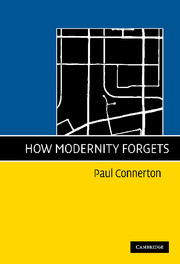4 - Topographies of forgetting
Published online by Cambridge University Press: 05 July 2015
Summary
If, then, the spatial frameworks of a culture, the way in which we set about the task of producing spaces, occupies a pivotal role in the localisation of cultural memory, if it establishes a topography of remembering, then this might lead us on to ask the further question and to return us to the question posed at an earlier stage: what is the effect of the produced spaces of contemporary culture on the transmission of cultural memory?
Its effect, I want to suggest, is to generate a particular kind of cultural amnesia; and, for the sake of heuristic convenience, I should like to distinguish three features of contemporary human settlement, which are inextricably intertwined, the investigation of which will help us to understand how this condition of cultural forgetting is generated. The first is the scale of human settlement. The second is the production of speed. The third is the repeated intentional destruction of the built environment. These phenomena are to be explained, in their turn, by the particular moment we have now reached in the capitalist process of production.
I
The ‘art of memory’ was a European rhetorical tradition which was sustained for some fifteen hundred years, from, let us say, Cicero to Leibniz. Ideas are not contextless; and in understanding this tradition of thinking about place memory, this ‘method of loci’ as its practitioners styled it, we need to keep in mind the characteristic life-spaces, what might be called the scale of emplacement, within which these conventions of rhetoric flourished. As the practice of an intellectual elite, this would have been a city world; but if we were able to walk through these cities we would immediately be struck by the concentration of people in a geographic space that by modern standards would appear minuscule. These were urban entities which came into existence behind well-equipped fortress walls and where the city ground plans took their shape and meaning from the distinctive opposition between city and land, between centre and periphery.
- Type
- Chapter
- Information
- How Modernity Forgets , pp. 99 - 131Publisher: Cambridge University PressPrint publication year: 2009
- 1
- Cited by



